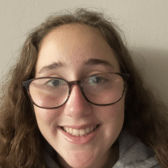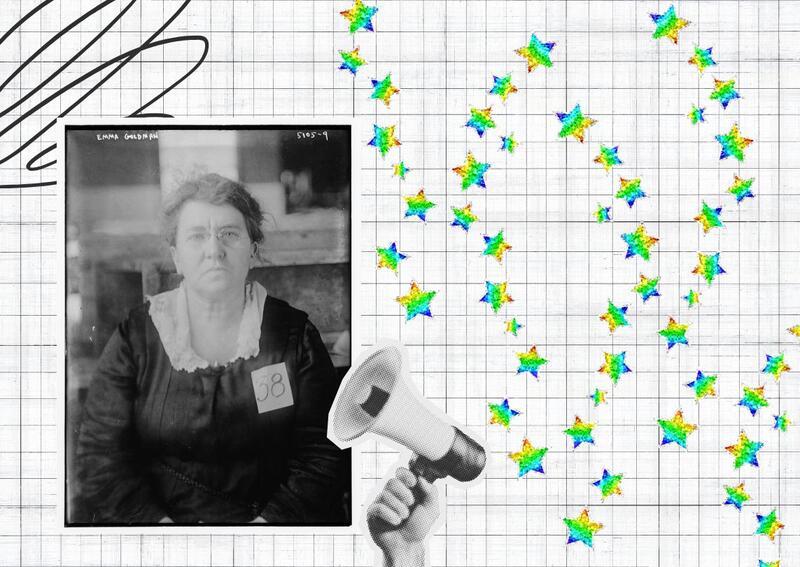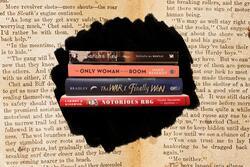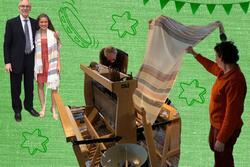Wrestling with Identity Politics
Identity is the word of my generation. Who we are and how we are. Or rather, the boxes we check on forms for applications: white, woman, Jewish, bisexual—in that order too; it's a ranked system. This “identity revolution” allows us to attempt to reform institutional wrongs that have plagued humankind since its inception, to explore more deeply how our background shapes us and informs us: the opportunities we are privileged to and the ones we are not, the discrimination we have faced and the hardship we have not—and how hardship is different.
And yet, in some ways this “identity revolution” introduces a new type of social order, forcing us into boxes that don’t actually tell a story of who we are. Instead of a conversation we have a social media profile description listed like a recipe. We disregard the past as a compilation of all the ways our lists weren’t accepted.
When some of my friends came out to me in middle school, I didn’t know much about LGBTQ+ identities. I was confused but accepting. Outside my friends, my classmates would talk about boys and dating and I was never all that interested—I had goofy crushes on a few boys here and there but didn’t like talking about it. A couple of years later, I realized that I really liked spending time with one of my Hebrew school friends—who was a girl—and then I was really confused. When I finally accepted that maybe I wasn’t all that straight, I thought that being queer had to be my entire personality. I was gay, my friends were gay, end of story. That was who we were. And I found comfort in this community that we were a part of—sharing this label with others gave me a sense of belonging.
Soon, my friends also told me about all the fill-in-the-blank-sexual labels. And I thought that I had to identify with one of those too.
“I’m bisexual… no I’m asexual…no I’m demisexual…no I’m pansexual…wait, I’m actually a lesbian.”
As my personhood increasingly became synonymous with my sexuality, my entire being was quaking—even as I barely crushed on anyone. Instead of claiming my place in a community, my sexuality felt like a rug that was constantly being yanked out from under me. I was constantly shifting, changing, feeling different—and I began to resent myself and I placed my friends on a pedestal too because they, as all-knowing middle schoolers, so clearly knew who they were.
As I entered high school, I found myself questioning my Jewishness too. Attending an Episcopalian school and sitting in a chapel almost every day left me desperately trying to hold on to my Jewish identity. So, I made being Jewish my entire personality too.
My school was very open and accepting, and yet I felt (and still do feel) awkward. I grew so accustomed to feeling so Jewish at my school where no one else is, that when I am in Jewish spaces, I feel like an imposter. So, what does that make me? Religiously Jewish? Culturally Jewish? Just Jewish? And yet, as all these questions ricocheted in my head, part of me wondered where the crushing pressure to label myself came from.
As I struggle to reconcile with the complexities of “finding an identity” I simultaneously recognize the decades of fighting that the U.S. government is now trying to reverse. So how do we proceed? How do I continue to recognize the importance of this thing that we call “identity” when I find myself so frustrated and limited by it?
In my search for finding and resisting the words for my identity, I turn towards Emma Goldman: a true activist who, nearly one hundred years ago, fought for women’s and labor rights as she championed the anarchist movement. Growing up in the Jewish ghettos of what is now Lithuania, Goldman’s childhood was defined by the expectations of Jewish womanhood. From a young age, her father told her that her function in life was to cook and to give birth.
After being introduced to radical social ideas, she immigrated to the United States where she, expecting liberation, was met with the hardship, inequality, and the societal rigidness that defined the Gilded Age. Frustrated, she soon discovered the anarchist movement whereupon she built her activism as she fought vehemently for women’s liberation, with a particular emphasis on sexual freedom. She rejected systems of power and embraced the political and social philosophy of absolute freedom.
What I find most compelling about Emma Goldman work is that her beliefs were uncompromisable; she remained dedicated to the ideal of absolute freedom even as her contemporaries did not. Namely, she supported queer people even as fellow anarchists felt that her position would too far radicalize the movement. She believed in free love.
I deeply admire Goldman’s relationship with Judaism as well. Although she rejected organized religion, she knew that her Jewish background provided groundwork for her commitment to activism—and she had a significant Jewish following. Goldman expanded what being Jewish looked like and her ideals guided her response to the various identities that she encountered over her lifetime. She persistently valued freedom above all.
There is a lot to digest with Goldman’s truly expansive work. I find a lot of parallels between Goldman’s values of absolute freedom and my own journey coming into my identities as a queer, Jewish woman.
After a few years of maturing, I realized that labels can be cumbersome—a convenience and explanation to others but a burden to myself. Through a mixture of mindsets called “not giving a f****” and “too or much homework to give a sh*t” I realized that I didn’t need labels to validate my hallway crushes or define my first relationship.
Similarly, I realized that my Judaism—certainly a more integral part to my being—is my own and it serves me. I use the lessons that I have gained from being Jewish both culturally and religiously in my everyday life—a relationship not unlike the role that Judaism played in informing Goldman’s values of justice.
Because identity itself is rather abstract, coming to terms with any identity is hard—especially when people around you are intent on defining you for themself. I admire how my generation has embraced self-expression. Yet, at the same time, I think that we have found new ways to prevent ourselves from truly embracing who we are. After I started understanding my sexuality as a fluid thing, I resented myself a lot less. I also found new friends who were into just being.
This piece was written as part of JWA’s Rising Voices Fellowship.







